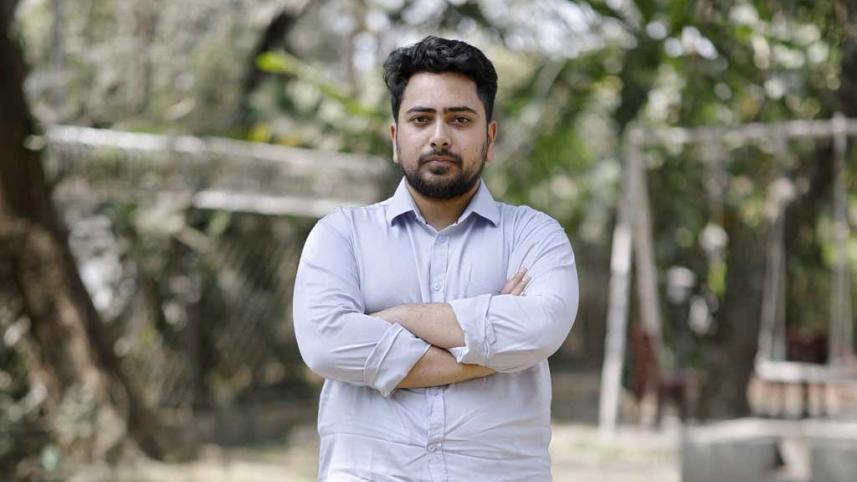‘We offered Yunus to lead govt on Aug 4’

Leaders of the Students Against Discrimination platform offered Nobel laureate Prof Muhammad Yunus the responsibility of leading a new government on August 4 last year, a day before the Awami League regime fell, said Nahid Islam, convener of the National Citizen Party, yesterday.
Once the SAD leaders committed to pursuing a one-point demand on August 3 last year, they also began planning for a new government, Nahid told reporters after his deposition with the International Crimes Tribunal-1.
"We initially chose Dr Yunus because we felt his leadership was necessary considering the grave crisis the country was facing."
On the second day of his deposition, Nahid presented his account of the events between July 19 and August 5 last year.
On July 18-19, during the internet blackout, he learnt of the widespread killings from other coordinators.
On July 19, he spoke with Abdul Qader, who announced a nine-point programme, and later with coordinators Hasnat Abdullah and Sarjis Alam, who were then in DGFI custody.
On July 20, after consulting with student leaders, they declared the continuation of their shutdown programme, which no electronic media covered. That night, the government imposed a curfew and issued shoot-on-sight orders.
While staying at a friend's Nandipara house, Nahid was abducted around 2:30am by men identifying as DB police.
Blindfolded, handcuffed and beaten, he was grilled about who organised the protests.
"They tortured me, and I lost consciousness several times. They told me I had been forcibly disappeared and warned I would never leave if I did not stop the movement," he said.
After 24 hours, he was dumped near Purbachal and admitted to Gonoshasthaya hospital.
There, he held a press briefing exposing his disappearance and torture, learning that many other coordinators had also been picked up.
The DGFI abducted Hasnat, Sarjis and Hasib Al-Islam, forced them to sit with three ministers and circulated the photos.
On July 22, Lt Col Sarwar of DGFI entered his hospital room and pressured him to suspend the movement. He threatened the lives of the disappeared coordinators.
The next day, the DGFI forced him to a Dhaka Reporters' Unity press conference, demanding he declare the movement was over and accuse the BNP-Jamaat of infiltration, which he refused. Upon his return to the hospital, he faced threats of being forcibly disappeared again.
On July 26, he, Asif Mahmud and Abu Baker Majumder were taken to the DB office, where then DB chief Harun Or Rashid threatened to implicate them in cases unless the movement was withdrawn.
They were abused, denied medication, and pressured through threats targeting their parents and female coordinators.
"At one point, under coercion, I was forced to call off the movement on camera, which was later circulated to the media."
At that time, DB officials told Nahid their actions were ordered by then prime minister Sheikh Hasina and former home minister Asaduzzaman Khan Kamal.
Harun even proposed that they go to the PM's office, which they rejected. Instead, they launched an indefinite hunger strike. A writ in the High Court secured their release on August 1. Weak and ill, six coordinators, including Nahid, immediately announced they had been forced to call off the movement.
On August 3, after consultations with anti-fascist student groups, they launched a one-point demand at the Central Shaheed Minar and announced a nationwide non-cooperation movement.
Initially set for August 6, the March to Dhaka was brought forward to August 5 after learning the government might block networks or kill or abduct them.
On that day, people marched from across the country.
Protesters came under gunfire at Shaheed Minar and Chankharpool but regrouped at Shahbagh after the army withdrew, turning it into a "human sea", Nahid said.
As they advanced towards Gono Bhaban, news spread that Hasina had fled by helicopter.
They announced the formation of an interim national government, demanded the release of political prisoners and rejected any form of military or military-backed rule.
Nahid testified that throughout the uprising, police, law enforcers, Awami League activists and affiliates shot at protesters, tortured detainees and carried out mass arrests.
Helicopters fired on demonstrators; bodies of the dead were disappeared or burnt; burials were not allowed; the injured were denied treatment; and families of martyrs were threatened.
He accused Hasina, then home minister, police and chiefs of security forces, demanding investigation, prosecution and severe punishment so that victims receive justice.
After the lunch break, the state defence counsel for Hasina and Kamal began cross-examining Nahid.
The other accused in the case is former inspector general of police Chowdhury Abdullah Al-Mamun, who has turned approver.
Nahid's cross-examination will resume on Sunday.
 For all latest news, follow The Daily Star's Google News channel.
For all latest news, follow The Daily Star's Google News channel.
Comments